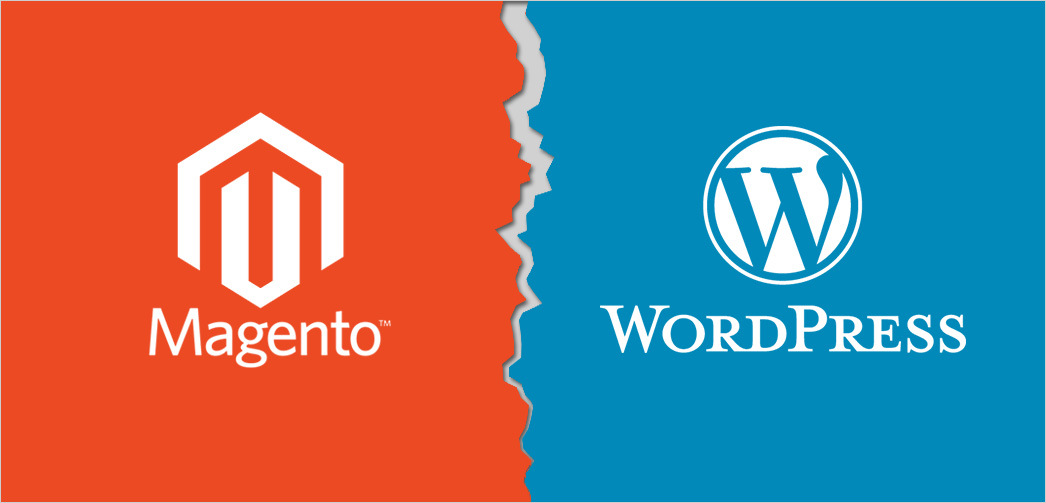
Whenever you decide to integrate eCommerce functionality into your website, the first thing that comes to the mind is: which online platform to choose. With so many options available in the market, developers are often befuddled when choosing the right platform to gauge your eCommerce business. Although most of the eCommerce platforms available offer tailored functionalities and are more or less equipped to benefit your business, but they too come with limitations. Therefore, it becomes necessary to pick the right platform that suits your eCommerce purpose the most.
Developers swear by the most widely used platforms, Magento and WordPress! Both these content management systems are loaded with excellent features and are equally good. Though they both look similar on the surface, each has unique characteristics to suit your business and their differences lie in their core purpose. Let’s understand both the platform before you zero in on any one of them:
Magento
Based on an open source technology, Magento offers rich e-commerce features and high level of customization and functionality that provides flexibility to the merchant to set up online stores as per their business needs. Magento is basically for the user who wants to develop an e-commerce website loaded with products. The dedicated features such as multi-store and catalogue management, search engine optimization, business reports, mobile commerce, marketing, and so on, rendered by Magento have been trusted by online store owners worldwide. Also, the CMS system of Magento simplifies the complex design of content pages, menus as well as version control. However, when it comes to developing a site using Magento, one needs the help of a professional Magento developers as Magento is a pretty complex platform.
WordPress
Just like Magento, WordPress is also an open and free source technology. However, this platform is equipped with blogging, publishing tool and content management system. It is famous for being user-friendly and featuring easy plug-in architecture and template customization. In fact, over 17% of the website, even the one that Magento owns, is driven by WordPress. The platform can be also be extended to support the functionality of eCommerce with the help of third party plug-ins. Developing and hosting a site on WordPress is inexpensive and can easily be done by the user. However, the biggest disadvantage is that one cannot create a heavy eCommerce site using WordPress. Also, WordPress does not allow you to load a variety of images of a single product easily. You need to manually enter all the images.
Identify Your Purpose
Both WordPress and Magento serve different and unique purposes and are equipped with interesting themes and excellent customization. Choosing one among both mainly depends on your website’s purpose. But whichever platform you choose, you are sure to reap the benefits of the best functionalities. Since both the platforms allow users to incorporate blogging features, they help owners to generate information and content as per the requirement. In the beginning, Magento seems to be an intricate platform to work with due to its complexed terminology and applications. Though a complex platform, Magento allows an eCommerce website to be fast, responsive and efficient. You can understand Magento well if you are apt with WordPress. In short, Magento is the WordPress of eCommerce.
Diversity in Development
The most prominent difference between the two is that WordPress is a content management platform while Magento is an out and out e-commerce platform. Once you start the development process, the difference between the functionalities of Magento and WordPress is evident. If your goal is to sell products, then Magento fits your bill, but if the sole purpose is to write and post content or blog then WordPress is a recommended option. Programming of WordPress comes with a set of sequenced PHP scripts while Magento is object-oriented and involves a great number of files and folders.
WordPress comprises a series of editable pages and posts. Multiple sets of loops and functions are used to call the post or page content while developing the template files. You can even add and apply custom templates on a single page. When it comes to CMS Static Blocks, which is required for placing content and images on CMS page or template, Magento posts and widgets functions act pretty similar to WordPress. In fact, Magento offers its own widgets with a high level of functionality as compared to Static Blocks.
Also Read: Magento eCommerce: Opportunities for ACES and PIES Software
When integrating a website, WordPress is known to offer heaps of eCommerce plug-ins and third party plug-ins. However, the third-party plugins in WordPress are less reliable and secure. On the other hand, since Magento was developed specifically for eCommerce, it has a better ability and functionalities and therefore, does not require plug-ins to set up e-commerce features and functions in a website. Magento is more secure than WordPress when using third party plugins. WordPress is ideal for eCommerce needs if you are only selling a few products.
It can be ascertained that though WordPress is easy to use and can be highly recommended for content-based website development, when it comes to integrating an eCommerce website, Magento is more efficient and recommended an alternative. If you are looking to building an online store with a huge list of products, Magento is your right comrade!
